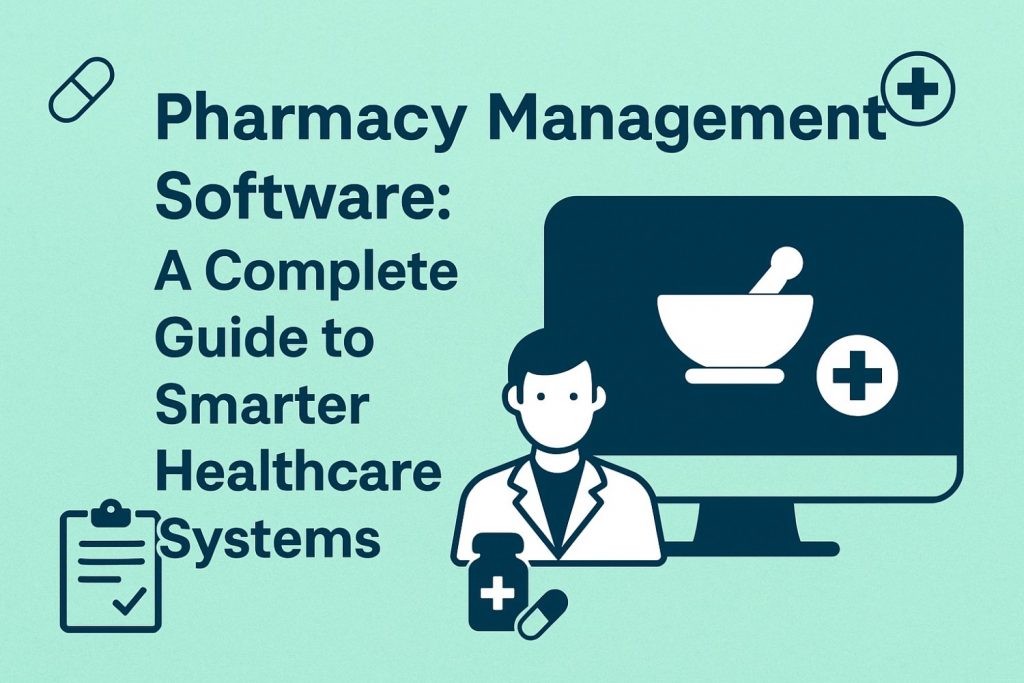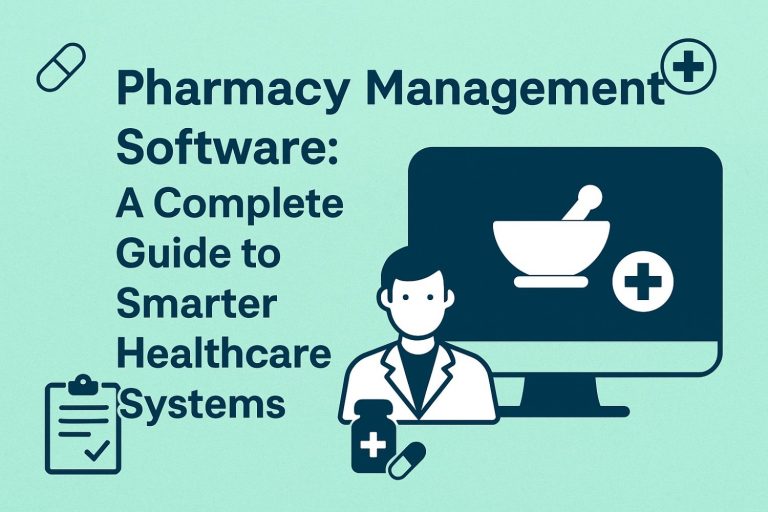Introduction
In today’s fast-evolving healthcare industry, technology is playing a crucial role in reshaping how hospitals, clinics, and pharmacies operate. Among the various innovations, pharmacy management software has emerged as a transformative solution. Not only does it streamline pharmacy operations, but it also improves patient safety, reduces human errors, and ensures accurate inventory management.
As patients expect faster services and healthcare providers aim for greater efficiency, adopting digital solutions is no longer optional—it’s essential. Moreover, by integrating with other tools like laboratory software and hospital software, pharmacy systems create a connected healthcare ecosystem. For this reason, whether you’re a small pharmacy owner or part of a large hospital chain, understanding how these systems work is vital.
In this blog, we will explore everything about pharmacy management software—from its definition and benefits to its key features, integrations, costs, and the future of pharmacy technology. We’ll also answer common questions that healthcare professionals often ask before adopting such solutions.
What is Pharmacy Management Software?
Simply put, pharmacy management software is a digital system designed to manage pharmacy operations, including prescription handling, stock tracking, billing, reporting, and patient records. Traditionally, pharmacies relied heavily on manual record-keeping and paper-based systems, which were prone to errors and inefficiencies.
Now, with digital transformation, pharmacies can enjoy:
- Real-time inventory tracking
- Accurate billing and invoicing
- Seamless integration with electronic prescriptions
- Better communication with doctors and patients
- Compliance with healthcare regulations
Furthermore, when paired with hospital software, it ensures a unified platform where doctors, pharmacists, and lab technicians work together efficiently.
Why is Pharmacy Management Software Important?
The importance of pharmacy systems can’t be overstated. Let’s break down the key reasons:
1. Accuracy in Prescriptions
Pharmacies handle hundreds of prescriptions daily. Manual errors can be costly and even dangerous for patients. By digitizing the process, accuracy improves dramatically.
2. Time-Saving for Staff
Instead of manually updating stock and patient information, pharmacists can automate these tasks. As a result, more time is spent serving patients.
3. Better Inventory Management
Out-of-stock medicines or expired drugs are serious concerns. A good software alerts staff before items run out or expire.
4. Integration with Other Systems
When connected with laboratory software or hospital management software, pharmacies become part of a bigger, efficient healthcare chain.
5. Regulatory Compliance
Healthcare regulations require precise documentation. Pharmacy systems maintain records digitally, ensuring compliance.
Key Features of Pharmacy Management Software
To choose the right solution, it’s important to know the must-have features.
- Inventory Management – Real-time stock updates, expiration alerts, and automatic reordering.
- Prescription Management – Digital prescription storage with error-checking features.
- Billing & Invoicing – Automated billing, insurance integration, and tax calculation.
- Patient Profiles – Detailed medical histories and purchase records for personalized service.
- Analytics & Reporting – Data-driven insights for sales, expenses, and operational efficiency.
- Multi-Store Support – Essential for large chains with multiple branches.
- Integration Options – Connectivity with hospital software and diagnostic centers.
These features improve overall patient care in addition to streamlining workflows.
How Does Pharmacy Management Software Work?
The system’s worth becomes more apparent when one understands how it operates. Here’s the typical workflow:
- Prescription Entry: Physicians deliver electronic prescriptions straight to the drugstore.
- Medicine Verification – The system cross-checks drug interactions or errors.
- Inventory Check – Real-time stock updates confirm availability.
- Billing & Payment – Automated bills are generated, with options for digital payments.
- Reporting – Daily, weekly, or monthly reports help in decision-making.
In addition, when combined with hospital management software, the pharmacy system ensures seamless coordination across the entire patient journey.
Benefits for Patients
Patients are at the center of healthcare, so the benefits they receive are significant.
- Faster prescription fulfillment
- Reduced waiting time
- Fewer errors in medicines
- Cashless transactions
- Reminders for repeat prescriptions
Clearly, Pharmacy management systems undoubtedly improve patient loyalty and happiness.

Benefits for Pharmacists and Hospitals
Healthcare providers also enjoy several advantages:
- Efficiency – Less time spent on manual work.
- Cost Savings – Reduced waste from expired drugs.
- Data Security – Patient and business data remain secure.
- Growth Opportunities – Better insights lead to improved strategies.
Moreover, when used alongside laboratory software and hospital software, pharmacies become a vital part of a complete healthcare management system.
Integration with Hospital and Laboratory Software
For maximum efficiency, pharmacies shouldn’t work in isolation. Instead, integrating with other systems ensures a connected healthcare ecosystem.
- With Hospital Software – Doctors can send prescriptions directly, reducing errors.
- With Laboratory Software – Test results can inform pharmacists about dosage adjustments.
- With Hospital Management Software – End-to-end patient care is streamlined, from diagnosis to treatment to pharmacy support.
Thus, integration ensures that every part of the healthcare chain works in sync.
Choosing the Right Pharmacy Management Software
When selecting software, consider the following factors:
- Ease of Use – A user-friendly interface ensures staff adoption.
- Customization – Tailor features to your pharmacy’s needs.
- Scalability – Suitable for both small and large setups.
- Integration – Must connect with existing hospital or lab systems.
- Cost – Balance features with budget.
- Support – Reliable customer support is crucial.
Additionally, partnering with a trusted provider of hospital management software ensures a robust and scalable solution.
Cost of Pharmacy Management Software
Costs vary depending on:
- Features required
- Cloud vs. on-premise deployment
- Number of users or stores
- Integration with other systems
Basic solutions may cost less, but advanced versions with integration into hospital software and analytics will be higher.
Future of Pharmacy Management Software
The future looks promising. Emerging technologies like AI, IoT, and blockchain are transforming pharmacy systems. For instance:
- AI for predicting demand and preventing drug shortages.
- IoT for real-time tracking of medicine storage conditions.
- Blockchain for secure drug supply chain management.
Thus, pharmacies that adopt digital solutions early will stay ahead in the competitive healthcare market.
FAQs
Q1. What is pharmacy management software?
It is a digital system that manages prescriptions, inventory, billing, and patient records in pharmacies.
Q2. Can pharmacy software integrate with hospital software?
Yes, integration allows seamless communication between doctors, pharmacies, and labs, reducing errors.
Q3. How does it benefit patients?
Patients enjoy faster service, accurate prescriptions, and digital payment options.
Q4. Is pharmacy management software expensive?
Costs depend on features, but options exist for both small and large businesses.
Q5. What role does hospital management software play?
It ensures a connected healthcare ecosystem by integrating pharmacy, laboratory, and hospital operations.
Conclusion
To sum up, pharmacy management software is revolutionizing how pharmacies operate. From managing prescriptions and inventory to ensuring compliance and patient safety, it is indispensable in modern healthcare. Additionally, when integrated with laboratory software and hospital software, it creates a unified system that benefits patients, pharmacists, and healthcare providers alike.
As the industry embraces digital transformation, investing in such systems is no longer a luxury—it’s a necessity. With the right solution, pharmacies and hospitals can not only enhance patient satisfaction but also streamline workflows, reduce costs, and prepare for the future.
By partnering with a trusted provider of hospital management software, healthcare institutions can take a big step toward smarter, more efficient care.

